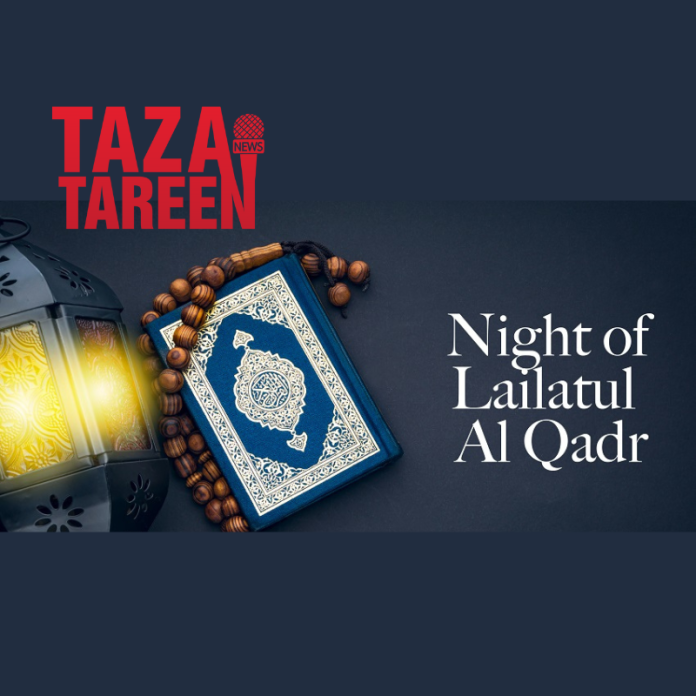Laylatul Qadr, moreover called the Night of Power, or Destiny, is one of the holiest nights in the Islamic calendar. It falls in the last ten days of Ramadan, a month of fasting, prayer, and spiritual reflection for Muslims. While the precise date remains unknown, it’s far believed to be one of the extremely good-numbered nights in the closing ten days of Ramadan.
The Significance of Laylatul Qadr
It holds full-size significance for numerous motives:
The Revelation of the Quran: The Quran itself refers to Laylatul Qadr in Surah Al-Qadr, stating it because the night time time the Quran became determined out to Prophet Muhammad (PBUH). This marked the start of divine guidance for humanity.
A Night of Blessings: This night time is defined as being higher than 1000 months of worship “[Qur’an 97:3]“. It’s a night overflowing with Allah’s (SWT) mercy, forgiveness, and benefits.
Increased Rewards for Good Deeds: Any genuine deeds finished on Laylatul Qadr are believed to be extended notably.
The Signs of Laylatul Qadr
-
Weather signs of Laylatul Qadr
-
The peacefulness of the night
-
Sun rising without rays
-
The brightness of the moon
-
Tranquility and unusual calmness in nature
Why Laylatul Qadr is Better Than 1,000 Months
The Qur’an states clearly:
“The Night of Decree is better than a thousand months.”
(Surah Al-Qadr, Ayah 3)
This means that one night of sincere worship on Laylatul Qadr is equal to more than 83 years of worship! This is an unimaginable opportunity. Imagine gaining the reward of a lifetime in a single night — it’s the ultimate spiritual gift from Allah to His believers.
Why We Don’t Know the Exact Date
Allah has chosen to hide the exact date of Laylatul Qadr to encourage us to seek it with effort and devotion. It teaches us sincerity — that we should not only worship on one fixed night but strive throughout the last ten nights. This builds consistency, humility, and deeper connection with Allah.
How we get this night without distraction
In today’s digital world, we are constantly distracted — by social media, screens, and endless notifications. Laylatul Qadr is the perfect time to disconnect from the dunya (world) and reconnect with your Creator. It’s a night to switch off your phone, shut the noise, and focus your heart on worship, reflection, and repentance.
To truly benefit from Laylatul Qadr, create a peaceful worship environment. Silence your phone, avoid unnecessary conversations, and dedicate your time to prayer, Qur’an recitation, dhikr (remembrance), and deep duas. Even if you can’t stay up the whole night, give your best in the time you can.
Is It on the 27th Night?
While many believe Laylatul Qadr falls on the 27th night of Ramadan, the Prophet Muhammad ﷺ taught us to seek it in the odd-numbered nights of the last ten. That includes the 21st, 23rd, 25th, 27th, and 29th nights. Don’t limit yourself to just one night — keep your heart active throughout the final stretch of Ramadan.
Practices for Laylatul Qadr
While the exact date of Laylatul Qadr is unknown, Muslims attempt to intensify their worship during the last ten nights of Ramadan, with a specific attention at the ordinary-numbered nights. Here are some common traditions and practices:
Increased Night Prayers: Muslims dedicate themselves to Tahajjud prayers, night prayers completed inside the ultimate 1/4th of the night.
Quran Recitation: Reciting the Quran is a crucial act of worship in this night.
Dua and Dhikr: Muslims interact in supplication (dua) and remembrance of Allah (SWT) (dhikr) in the course of the night.
Itikaf: Some Muslims have a look at Itikaf, a retreat spent in prayer and contemplation inside the mosque, over the past ten nights of Ramadan, hoping to revel in Laylatul Qadr during this dedicated worship duration.
Charity and Good Deeds: It’s a time for extended generosity. Muslims attempt to give charity (sadaqah) and carry out appropriate deeds to gain others.
Don’t Miss the Night That Can Change Your Life
Laylatul Qadr is not just any night. It’s a golden opportunity to rewrite your destiny, seek sincere forgiveness, and gain massive rewards that will shine in both this life and the next. It is a time for religious enrichment and looking for Allah’s (SWT) mercy. By devoting oneself to prayer, accurate deeds, and supplication over the last ten nights of Ramadan, Muslims wish to experience the benefits and rewards related to this sacred night time. Whether you’re young or old, a student or a working parent — this night belongs to you. So prepare your heart, your dua list, and your intentions. Because one night… can change everything.


